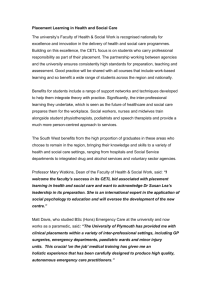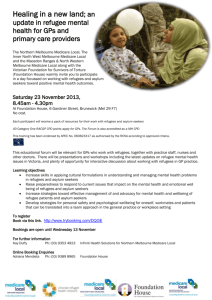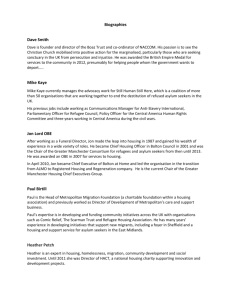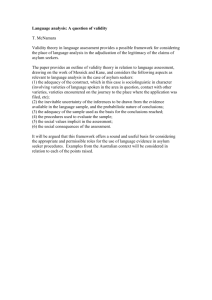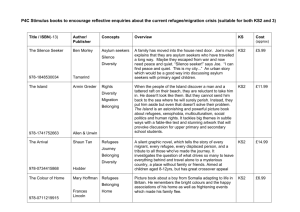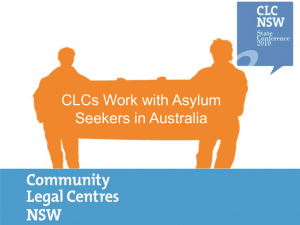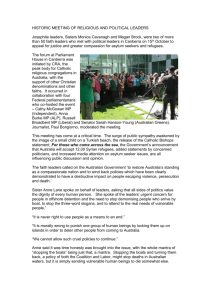flyer
advertisement
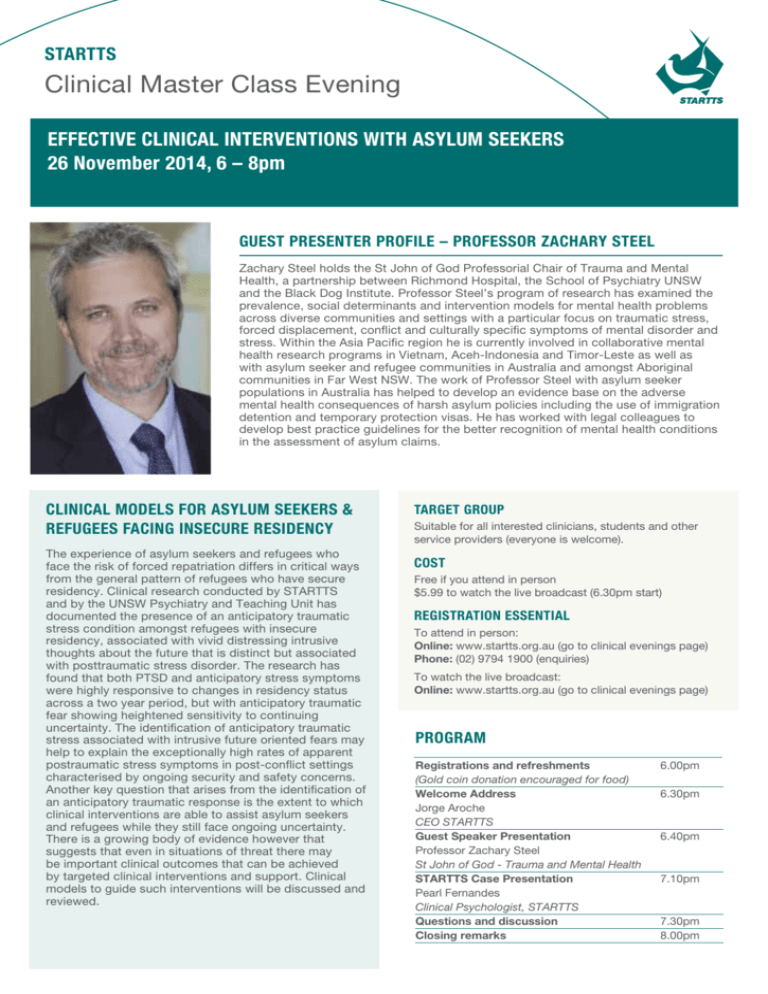
STARTTS Clinical Master Class Evening effective clinical interventions with asylum seekers 26 November 2014, 6 – 8pm Guest Presenter Profile – professor zachary steel Zachary Steel holds the St John of God Professorial Chair of Trauma and Mental Health, a partnership between Richmond Hospital, the School of Psychiatry UNSW and the Black Dog Institute. Professor Steel’s program of research has examined the prevalence, social determinants and intervention models for mental health problems across diverse communities and settings with a particular focus on traumatic stress, forced displacement, conflict and culturally specific symptoms of mental disorder and stress. Within the Asia Pacific region he is currently involved in collaborative mental health research programs in Vietnam, Aceh-Indonesia and Timor-Leste as well as with asylum seeker and refugee communities in Australia and amongst Aboriginal communities in Far West NSW. The work of Professor Steel with asylum seeker populations in Australia has helped to develop an evidence base on the adverse mental health consequences of harsh asylum policies including the use of immigration detention and temporary protection visas. He has worked with legal colleagues to develop best practice guidelines for the better recognition of mental health conditions in the assessment of asylum claims. clinical models for asylum seekers & refugees facing insecure residency The experience of asylum seekers and refugees who face the risk of forced repatriation differs in critical ways from the general pattern of refugees who have secure residency. Clinical research conducted by STARTTS and by the UNSW Psychiatry and Teaching Unit has documented the presence of an anticipatory traumatic stress condition amongst refugees with insecure residency, associated with vivid distressing intrusive thoughts about the future that is distinct but associated with posttraumatic stress disorder. The research has found that both PTSD and anticipatory stress symptoms were highly responsive to changes in residency status across a two year period, but with anticipatory traumatic fear showing heightened sensitivity to continuing uncertainty. The identification of anticipatory traumatic stress associated with intrusive future oriented fears may help to explain the exceptionally high rates of apparent postraumatic stress symptoms in post-conflict settings characterised by ongoing security and safety concerns. Another key question that arises from the identification of an anticipatory traumatic response is the extent to which clinical interventions are able to assist asylum seekers and refugees while they still face ongoing uncertainty. There is a growing body of evidence however that suggests that even in situations of threat there may be important clinical outcomes that can be achieved by targeted clinical interventions and support. Clinical models to guide such interventions will be discussed and reviewed. TARGET GROUP Suitable for all interested clinicians, students and other service providers (everyone is welcome). COST Free if you attend in person $5.99 to watch the live broadcast (6.30pm start) REGISTRATION ESSENTIAL To attend in person: Online: www.startts.org.au (go to clinical evenings page) Phone: (02) 9794 1900 (enquiries) To watch the live broadcast: Online: www.startts.org.au (go to clinical evenings page) PROGRAM Registrations and refreshments6.00pm (Gold coin donation encouraged for food) Welcome Address6.30pm Jorge Aroche CEO STARTTS Guest Speaker Presentation6.40pm Professor Zachary Steel St John of God - Trauma and Mental Health STARTTS Case Presentation7.10pm Pearl Fernandes Clinical Psychologist, STARTTS Questions and discussion7.30pm Closing remarks8.00pm STARTTS Presenter Profile – pearl fernandes Pearl Fernandes is a Clinical Psychologist with over 15 years experience working with refugee trauma at STARTTS. She has extensive experience working with asylum seekers and temporary protection visa (TPV) holders, and has expertise with both individual and therapeutic group work with this client group. She published her work with a group of TPV holders in a chapter in the book ‘Asylum Seekers and Refugees in Australia: Issues of Mental Health and Wellbeing’ (2003). She has successfully trialled and implemented creative approaches for traumatised populations. Her most recent project has been the development of a therapeutic program ‘Jungle Tracks’. ‘Jungle Tracks’ is a program that utilises a story telling approach in the treatment of traumatised adolescents and young children. In addition to providing direct services to this client group, she provides clinical supervision and training to staff at STARTTS, students, intern psychologists and allied health professionals. She has presented papers at national and international conferences. aren’t they ordinary people? they are just like you and me....but, have survived extraordinary challenges Offshore processing and detention has the potential to exacerbate symptoms in asylum seekers and further impair their healing and recovery. Looking at the issues pragmatically, people like Pearl’s client ‘Vijay’ sacrifice everything and risk their lives in attempts to find safe haven. However, overwhelmed by helplessness, grief, guilt and shame upon the realisation that there is no real end to their miseries in the forseeable future, their past returns to haunt them with renewed vigour. Many of the recently introduced draconian measures remind them of the regimes they have escaped from. As clinicians we run the risk of ‘hardening our hearts’ and succumbing in this political conundrum or feel equally helpless and get swept away by the tide of compassion. In this case presentation Pearl will illustrate how as clinicians we may tap into and unleash the wellspring of courage and resilience in our refugee clients. VENUE STARTTS 152-168 The Horsley Drive, Carramar NSW (Enter STARTTS from Mitchell St) ABOUT STARTTS The NSW Service for the Treatment and Rehabilitation of Torture and Trauma Survivors helps refugees recover from their experiences and build a new life in Australia. We are committed to promoting excellence in clinical practice and invite local and international speakers recognised as experts in their field to run clinical seminars and clinical master class evenings relevant to the treatment and rehabilitation of torture and trauma survivors. Over the last few years STARTTS has hosted very successful seminars presented by high calibre speakers such as Dr Bessel van der Kolk, Dr John Briere, Dr John Arden, Dr Daniel Siegel and Dr Louis Cozolino. Please refer to STARTTS’ website www.startts.org.au for more details. STARTTS is a registered charitable organisation and donations over $2 are tax deductable. THE CLINICAL MASTER CLASS EVENING PROGRAM STARTTS’ Clinical Master Class Evenings are held five times per year and aim to provide an opportunity for clinicians working with refugees to extend their understanding of refugee trauma by inviting expert speakers to present on interesting and practical topics. These presentations are followed by a case study presentation by an experienced STARTTS staff member and a panel discussion. LIVE INTERNET BROADCAST If you can’t make it to Carramar, then you can save on time and petrol by watching the live internet broadcast of these events from your own computer. It only costs $5.99 to register via STARTTS’ website, and you will be able to participate in the panel discussion by sending in your typed questions which are answered live. ONLINE LECTURES These events are recorded by Psychevisual and are available for viewing on the internet at a later date for a fee. Please see the Psychevisual website www.psychevisual.com.
